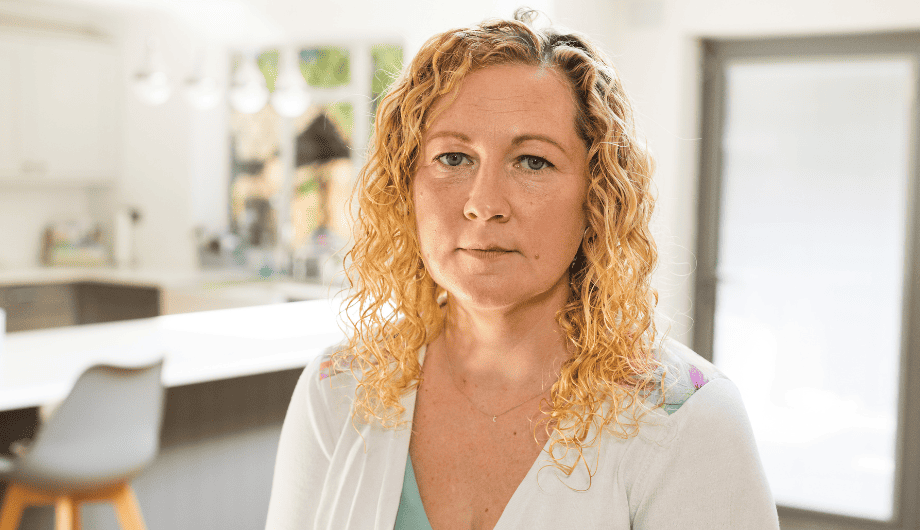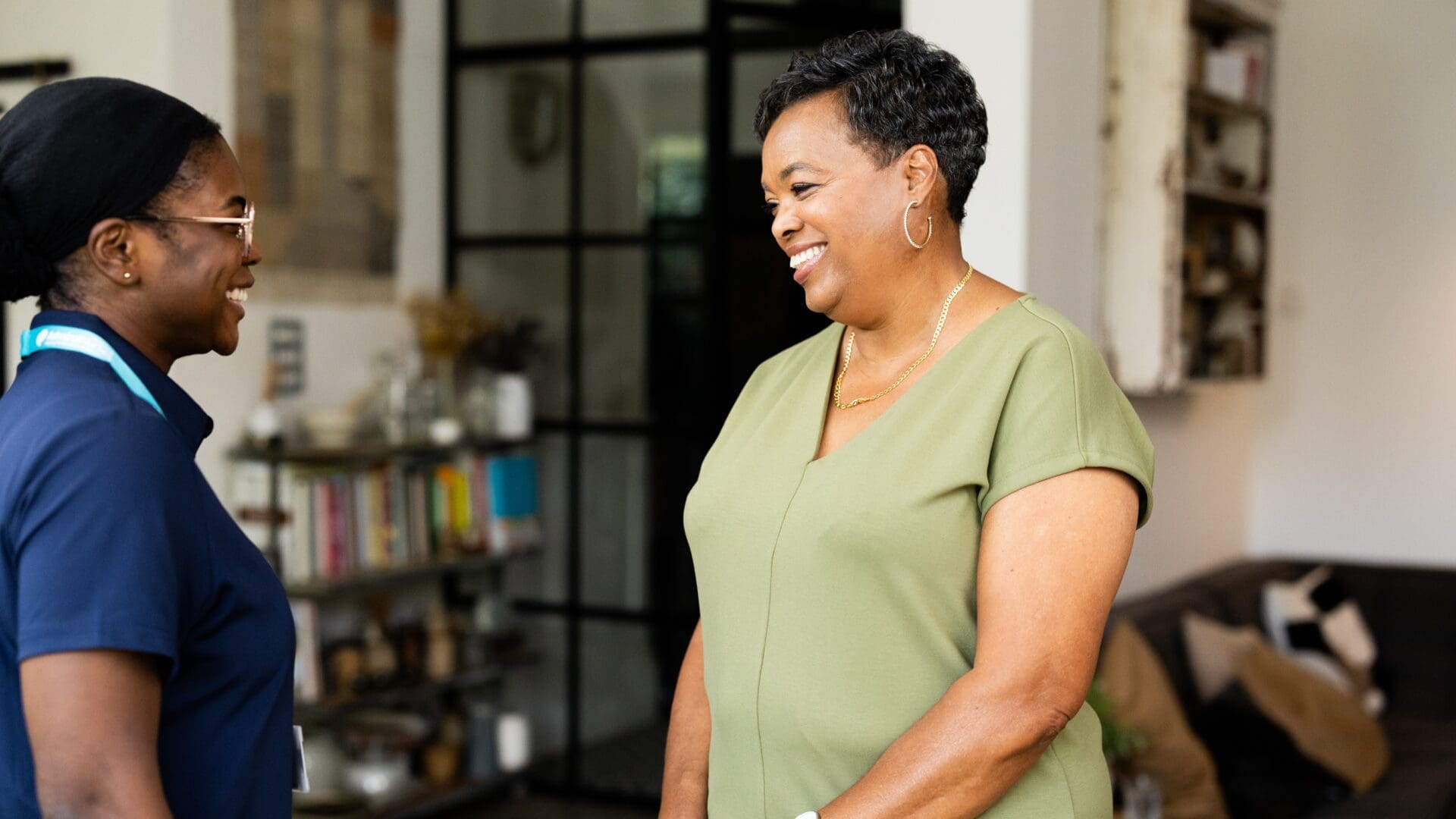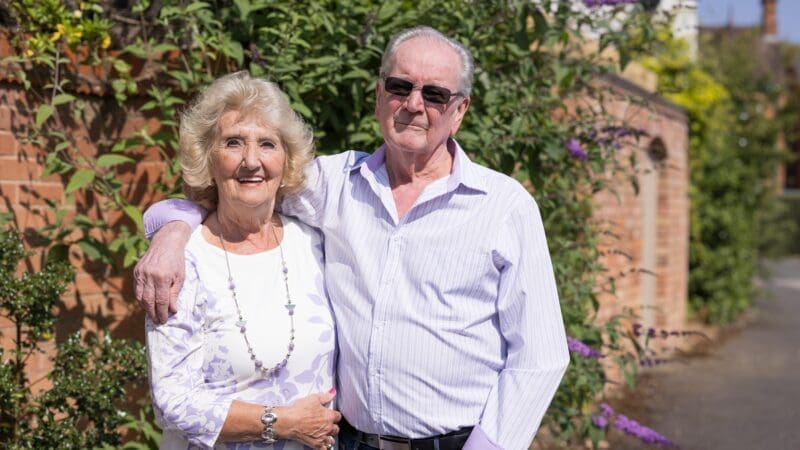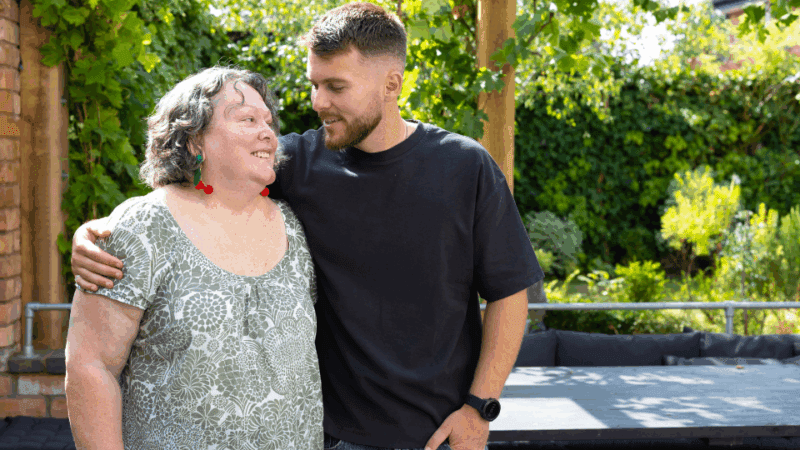
Clare’s story – We live with dementia
As a carer for her mum, who has vascular dementia, Clare is taking part in our ‘We live with dementia’ campaign to make more people aware of the support our nurses offer.

Safia, a dementia specialist Admiral Nurse for the Black, African and Caribbean Communities, speaks to Elene, whose mum lived with dementia. They reflect on the importance of culturally appropriate dementia care and support.
Elene: My mum had four siblings and got the nickname ‘Little Sis’. It stuck, and she has been known as ‘Sis’ ever since. My son didn’t even know her real name until he was 38 years old! Mum was quiet, hardworking, and strict.
Mum lived in Reading and I lived in Birmingham, so I saw her roughly once a fortnight. Looking back, I missed so many of the early signs of dementia. Mum’s curtains would still be drawn at 10am and when I asked why, she would say she couldn’t be bothered to open them. She would lose her keys all the time, but she always had a story to tell and a reason for everything.
In June 2019, Mum called me to say someone had broken into her house. Later that day, the police let me know that she had called them but there wasn’t anybody in her house. That’s when I knew something wasn’t right. I took Mum to the GP the next day and he referred her to the Mental Health Team to do an assessment.
Mum was diagnosed with mixed dementia in August 2019. But when her GP broke the news, she wouldn’t accept the diagnosis. She shot out of her chair, saying, “I don’t have dementia!” She was very quiet after we left. I kept trying to gently bring it up, but she didn’t want to talk about it.
As Mum’s dementia progressed, she became paranoid and started barricading herself into her bedroom at nighttime. I was completely out of my comfort zone. I was trying to get information from anywhere I could but every door I tried to open closed in my face.
I contacted Social Services, and they visited Mum at home to assess her, but when I followed up a few weeks later, they said that her case had been closed as she wasn’t a danger to herself. I’m not ashamed to say I cried. I thought, “Lord, what am I going to do?”
I didn’t know about dementia specialist Admiral Nurses then, but I found Dementia UK online and decided to call its Helpline. I told the Admiral Nurses everything. I found the information they gave me really helpful, and it helped me to make the decision to move Mum to Birmingham to be closer to me and to find a suitable care home for her.
Elene: Stigma around dementia is a big issue in the Black, African and Caribbean community. It prevents a lot of families from even going to the GP; it’s a huge barrier. I remember as a child, ‘dementia’ wasn’t a word that was used. Instead, we would use words like ‘mad’ or ‘senile’.
People are afraid to even talk about dementia. Mum had a lot of family in her area; she couldn’t walk down the road without bumping into a family member. Yet nobody voiced their concerns to me until after Mum was diagnosed. It’s important that the community talks to one another about dementia more openly. We need to open doors for each other rather than shut them.
Safia: Often, families from Black, African and Caribbean backgrounds don’t seek dementia support as they are afraid of being discriminated against or shunned by their community. We are resilient and adaptable and would often rather depend on ourselves and our families, rather than seek outside support. A lot of people are reluctant to even identify as carers; they see caring as part of their duty to their parents or grandparents. Some people feel like seeking support is failing their family. This can make caring for someone living with dementia feel isolating and lonely.
We need to start talking very honestly and courageously about what living with dementia feels like and how it impacts us. When you speak to other people in your community, you realise there are so many people facing similar issues. You aren’t alone on the journey.
Elene: I think it’s important that culturally appropriate care is given in care settings. There have been times when my Mum’s care home has called me to say that she was refusing to eat. When I visited at lunchtime, they put a plate in front of her with one slice of garlic bread on it. I knew she wouldn’t eat it as it wasn’t a type of food that she would even recognise. I had a meeting with the chef to ask if they could incorporate sweet potato or pumpkin into her meals, but nothing changed. So I had to either cook for Mum myself or provide sweet potato and pumpkin to the chef.
Mum had afro hair so I provided shampoo for the care home. One morning I visited, and the carer said they had washed her hair. I started to comb Mum’s hair through and there was a bit dollop of moisturiser on her head. The product needed to be worked into her hair but the carers didn’t know how to do it. I started washing Mum’s hair when I visited to make sure it was done properly.
Safia: It’s absolutely heartbreaking that Elene’s mum went through this as food and nutrition are an essential and fundamental human need. When it comes to dementia, you have to look at things from a person-centred lens. There isn’t a ’one size fits all’ approach. We need to ask, “Who is this person before me? What do they eat? What music do they like to listen to? What makes them happy?” This is how we provide culturally appropriate care.
Safia: Dementia doesn’t discriminate, but culture affects how we receive and respond to support services. Our culture shapes our values, traditions, morals and beliefs. My role is specifically dedicated to providing people from Black, African and Caribbean communities with culturally informed dementia advice, support and guidance. As a Black African-Caribbean person, I may also pick up on cultural nuances that healthcare professionals from other communities may not.
It’s an honour to try to break down some of the stigma surrounding dementia and to deliver support, as well as educating and raising awareness of dementia in our community.
Elene: I wish Safia’s post had existed six years ago when my mum was diagnosed with dementia. It would have made such a difference. I don’t want other people to go through the struggles I’ve been through and Safia’s role will help make that road a lot easier for other people from our community.
The clinics offer appointments with a dementia-specialist Admiral Nurse for people from Black, African and Caribbean communities who are living with dementia, and their families. This is an opportunity to access free, expert, confidential and culturally sensitive dementia support and advice.

As a carer for her mum, who has vascular dementia, Clare is taking part in our ‘We live with dementia’ campaign to make more people aware of the support our nurses offer.

Sylvia and George share the importance of having open conversations in order to cope with Sylvia's diagnosis of Alzheimer's disease.

Ronnie and her son, Will, reflect on how her diagnosis of young onset Alzheimer’s disease has impacted their lives.